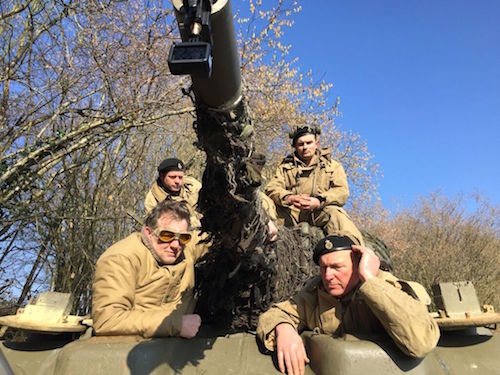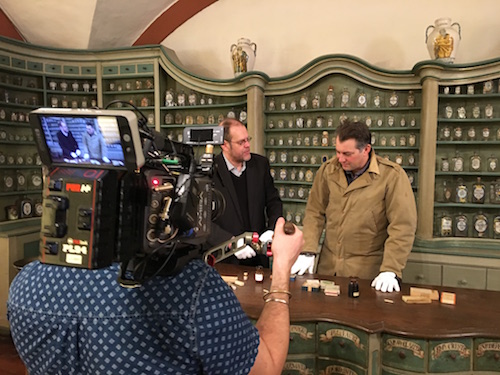Communiqué
World War Speed | SECRETS OF THE DEAD | Tuesday, June 25 at 8 pm
< < Back toSecrets of the Dead: World War Speed
Premieres Tuesday, June 25 at 8 p.m. on PBS, pbs.org/secrets and the PBS Video app
 Stories about drug use by Hitler and German forces during World War II have been widely told. What’s less well known is the Allied commanders’ embraced pharmacological “force enhancers” as well. By 1941, rumors about Nazi soldiers using a “super-drug” identified as the methamphetamine Pervitin were confirmed, and Allied commanders launched their own classified program to find the perfect war-fighting drug.
Stories about drug use by Hitler and German forces during World War II have been widely told. What’s less well known is the Allied commanders’ embraced pharmacological “force enhancers” as well. By 1941, rumors about Nazi soldiers using a “super-drug” identified as the methamphetamine Pervitin were confirmed, and Allied commanders launched their own classified program to find the perfect war-fighting drug.
During the war, one in three Allied soldiers were incapacitated without a physical scratch on them. Modern weapons and warfare proved so terrifying that almost as many men were shredded by combat fatigue and shell shock — now known as Post Traumatic Stress Disorder (PTSD) — as by bullets and shrapnel. Allied commanders believed Benzedrine, an amphetamine similar to Pervitin, was the answer, hoping the amphetamine would defeat not just the need for sleep, but anxiety and fear among troops. How this drug affected the course of World War II is an ongoing controversy.
In Secrets of the Dead: World War Speed, join historian James Holland on his quest to understand how the use of amphetamines affected the course of World War II and unleashed “the world’s first pharmacological arms race.”
- James Holland – World War II historian, author, and Royal Historical Society fellow
- Rasmus Svihus – museum director, Flyhistorisk Museum, Stavanger, Norway
- Peter Steinkamp – medical historian, Ulm University, Ulm, Germany
- James Pugh – historian, University of Birmingham, Birmingham, UK
- Edgar Jones – professor of war psychiatry, King’s College, London, UK
- Astrid Ley – deputy director, Sachsenhausen Memorial Center, Oranienburg, Germany
Noteworthy Facts
- Created in the 1930s by a German pharmacologist and manufactured by Temmler Pharmaceutical, the methamphetamine Pervitin was marketed for use by the general public using a campaign modeled on Coca Cola’s global strategy. The stimulant was then given to Luftwaffe pilots to keep them awake and alive if their plane was shot down.
- In May 1940, German troops under the influence of Pervitin had conquered Poland and were preparing for an attack against France. Ahead of the battle, 35 million Pervitin pills were delivered to 3 million Wehrmacht soldiers within 10-12 weeks. The Wehrmacht soldiers then managed to fight and march for 10 days straight, covering an average of 22 miles per day. The Wehrmacht were able to trap the entire British army on the beaches of Dunkirk in what is considered one of the greatest feats in military history.
- For Allied soldiers, caffeine was the primary stimulant of choice. Coffee was so closely associated with American soldiers, also known as GI Joes, that the term ‘Cup of Joe’ became synonymous with the drink.

- In 1940, the British army discovered Pervitin in a downed German plane in the south of England, unlocking the secret to the German troops’ boundless energy, and leading the Allies to consider the same tactic for their troops. The Allied troops decided to use the amphetamine Both drugs make users intensely alert by flooding them with a sense of euphoria. With its added methyl-group molecule, Pervitin races across the blood-brain barrier a bit faster than Benzedrine. Otherwise, the two drugs have virtually the same impact.
- Following the British victory in El Alamein, American soldiers entered into ground combat in North Africa in November 1942. The troops carried with them packs of Benzedrine after U.S. General Dwight Eisenhower orders some half million tablets for them.
- The German Navy’s mini-subs, used to torpedo Allied ships moving supplies and troops across the English Channel, required soldiers to sit in a confined space for 48 hours without sleeping or much movement. Searching for a solution to keep these submariners awake and alert, the German Navy tested out combinations of cocaine and methamphetamines by forcing prisoners of the Sachsenhausen concentration camp to take the stimulant and carry sacks of rocks around its infamous shoe-testing track.
- Following World War II, the usage of Benzedrine and Pervitin continued. By the 1950s, amphetamines were marketed as a diet pill and mood enhancer with celebrities like Marilyn Monroe and Jack Kerouac using the stimulants.
Series Overview
At the intersection of science and history, Secrets of the Dead uses the latest scientific discoveries to challenge prevailing ideas and throw fresh light on unexplained historical events.
Production Credits
Secrets of the Dead: World War Speed is a production of Brave Planet Films and THIRTEEN Productions LLC for WNET. Written and directed by Steven Hoggard. Narrated by Jay O. Sanders. Produced by Daphna Rubin. Steven Hoggard and Daphna Rubin are executive producers for Brave Planet Films. Stephanie Carter is executive producer for Secrets of the Dead.


